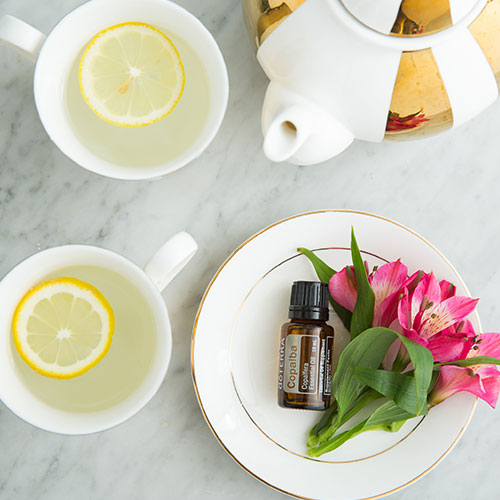Origin: a Latin derivative
meaning "Gift of the Earth."
- Shop
-
Our Story
- View Our Story Home
- Who We Are. . . .
- What We Do. . . .
- Why We Do It. . . .
-
dōTERRA[doh-teh-ruh]

As a board-certified emergency physician, father of five, husband, and lay minister, I wear many hats. Life can get hectic—think late-night ER shifts, kids’ scrapes and homework stress, community service, you name it. If I had to pick just one essential oil to help me through it all, my favorite single oil would be Copaiba. I reach for doTERRA Copaiba essential oil daily in my roles as a doctor and as a dad. Taking internally, it's my go-to for soothing anxious feelings, easing discomfort and supporting my family's needs. In fact, a few years ago I learned about Copaiba’s benefits directly from Dr. David Hill, who encouraged me to take a drop sublingually (under the tongue) each day along with Frankincense. I’m grateful for that advice—it has made a noticeable difference in how balanced and resilient I feel both mentally and physically.*
Growing up in England with physician parents, I was exposed early to both modern and herbal solutions. Still, I didn’t fully appreciate Copaiba’s power until I immigrated to the US and settled in South Dakota. Here I was, a British-trained doctor in the wide-open Midwest, skeptical yet curious about natural approaches. The scientist in me needed proof. So I dove into the research—and what I found amazed me. Modern studies are now confirming what traditional Amazonian elders have known for centuries: Copaiba offers remarkable benefits. Let’s explore a few of those benefits, backed by science, and how I use this oil in everyday life.
Supporting a Healthy Inflammatory Response, Naturally
One of Copaiba’s most celebrated benefits is its natural ability to support a healthy inflammatory response when used internally. A comprehensive meta-analysis by Brazilian researchers (Ferro et al.) reviewed numerous studies on Copaiba oil. The results were inspiring: Copaiba demonstrated significant ability in preclinical studies to support a healthy inflammatory response and even showed promise as a natural alternative for managing discomfort and related concerns. In other words, science suggests that Copaiba can help “take the heat out” of our body’s inflammatory responses.*
Researchers believe Copaiba’s high levels of beta-caryophyllene (a compound that interacts with our body’s cannabinoid receptors) help support relief in a natural way. In fact, although Copaiba doesn’t contain psychoactive cannabinoids, but the main component, β-caryophyllene (BCP), may be neuroprotective and may have cardiovascular and immune benefits when consumed.* For me, knowing there’s scientific evidence behind Copaiba’s soothing power gives me confidence in using it internally for myself, my patients (when appropriate), and my kids after their soccer games or backyard adventures.*
Finding Calm Amidst the Chaos
Beyond the physical, Copaiba has become my aromatic anchor. In the chaos of an emergency department or the bustle of a household with five children, stress and anxious feelings can run high. I’ve made it a habit to diffuse Copaiba or simply inhale it from a drop in my palms whenever I need a moment of calm clarity—whether it’s before a high-pressure family decision or a tense hospital meeting. The oil’s warm, woody notes create a grounding aroma, almost like a deep breath of a peaceful forest and science backs this up.
A 2022 randomized controlled study examined Copaiba’s ability to create a calming environment for adults performing stress-inducing tasks, like tricky memory and math tests, compared to a placebo. The results were striking! Those who used Copaiba had a measurably better experience. I often liken it to a musical metaphor—if stress is a loud, discordant noise, Copaiba is like a soothing tune that restores harmony. Even in my role as a lay minister, I sometimes diffuse Copaiba during evening prayer or counseling sessions. It helps create a peaceful atmosphere where everyone (including me!) can feel at ease.
Knowing that research supports this makes these moments of calm feel all the more valid and powerful.

Caring for Skin and Scars
Another area where Copaiba shines is in skincare. With five active kids, my wife and I have seen our share of cuts, scrapes, and more. We keep Copaiba in our family first-aid kit now because of its gentle yet effective benefits for the skin. I remember when one of my daughters took a spill off her bike and distressed the skin around her knee. After the initial first aid, we applied a diluted drop of Copaiba to the distressed area regularly. The skin’s appearance improved significantly. Interestingly, clinical research mirrors our experience.
A 2021 double-blind, placebo-controlled study led by dermatologist Dr. Jill Waibel investigated the impact of Copaiba oil on the appearance of skin imperfections. In the trial, patients applied a silicone gel containing Copaiba oil to their skin issues, while a control group used a plain gel. After 84 days (about three months), the difference was clear. All the patients using the Copaiba-infused gel showed improvement in their skin’s appearance, as measured by a standard assessment scale. Photographs from the study confirmed visible improvement with a high percentage of patients saying they were satisfied or very satisfied with Copaiba oil's restorative results. The study concluded that Copaiba in the topical gel led to significant improvements and helped reduce the appearance of the skin blemishes.
For a clinician like me, that’s compelling evidence. In practice, I suggest friends and family try a drop of Copaiba in their favorite lotion or carrier oil to address similar issues, including occasional blemishes and irritations. I love that one bottle of Copaiba oil covers so many bases: from skincare to soul care.
How to Use Copaiba in Daily Routines
Copaiba may be a powerhouse, but it’s also wonderfully gentle when used correctly. Here are a few practical, evidence-informed ways I incorporate Copaiba into daily life – approaches you can try too:
- Daily Under-the-Tongue Ritual: Every morning, I take one drop of doTERRA Copaiba under my tongue. This sublingual method allows the oil’s components to absorb quickly. It’s part of my daily wellness regimen, often paired with a drop of Frankincense, as Dr. Hill taught me, to support a healthy inflammatory response and promote calm throughout the day.* If you’re new to internal use, start with just one drop and make sure you’re using a pure, high-quality oil labeled for internal use. doTERRA’s Copaiba is tested and safe for ingestion in recommended amounts.
- Aromatic: Use Copaiba aromatically as you unwind or with calming activities to center yourself. You can add a few drops to a diffuser. I enjoy blending it with Lavender or Wild Orange in the evening or simply put a drop in your palms, cup them over your nose, and take slow breaths. This is my go-to before heading into a busy day or when I transition from work to family time. Inhaling Copaiba’s soothing scent can help create a calm environment – a benefit backed by research.
- Soothing Massage Blend: This is one of my favorite ways to use it. After a strenuous workout or a long day on my feet in the ER, I'll rub a drop or two (diluted in fractionated coconut oil) on my knees or back. Within a short time, I feel less tension and discomfort. For topical relief of soreness or tension, mix Copaiba with a carrier oil, like fractionated coconut oil, and massage into the affected area. I often combine 2–3 drops of Copaiba with a bit of Deep Blue® Rub or another lotion to support my muscles after exercise or to relieve occasional joint discomfort. This is like having a nature-sourced soothing balm in hand. Just remember to dilute, especially for sensitive skin, and avoid broken skin.
- Skin Support and Healing: Add Copaiba to your skincare rituals. You can blend a drop into your moisturizer to take advantage of its complexion-clearing benefits (goodbye, blemishes!), or apply it to skin imperfections. As that study showed, consistent use of a Copaiba-infused topical product can improve the appearance of skin over time. In my household, we use a DIY salve with Copaiba and Lavender on minor cuts once they’ve closed – it’s our way of giving the skin a little extra natural help. Always keep the area clean and check with a healthcare provider for serious wounds, but for everyday skin support, Copaiba is a trusted friend.
- Mindful Spiritual Practice: This is more personal, but I’ve found Copaiba helpful in my meditation and prayer as a lay minister. I sometimes put a drop on my wrists or diffuse it in my home office during my morning devotional. The grounding aroma complements this personal practice, which helps quiet my mind and deepen my focus. It’s a beautiful example of how an essential oil can support us in a holistic way.
Bridging Science and Everyday Life
From my British roots to my current life on the South Dakota plains, Copaiba essential oil has been a faithful companion in my journey of blending modern with natural wellness. I’m continually amazed that golden resin from a towering Amazonian tree can impact my health so profoundly here in the 21st-century Midwest. The scientific studies I’ve shared give credible backing to what I’ve personally experienced. Copaiba works on multiple levels to support health. It’s not a magic bullet or a replacement for medical care, of course, but it’s a powerful tool in our family’s wellness toolkit.
In my emergency medicine practice, I often see the limits of conventional treatments alone. Incorporating safe, evidence-backed natural options like Copaiba helps me and my loved ones proactively care for our health in between those doctor visits. It’s pretty inspiring to witness an essential oil bring together the best of both worlds: the ancestral wisdom of natural solutions and the validation of modern research. Every time I take my daily drop of Copaiba or suggest it to a friend, I feel like I’m honoring both my medical training and my desire to live holistically.
In the end, Copaiba has earned its place as my favorite essential oil because it consistently enriches my life, professionally and personally. It helps me stay calm in the storm, supports my body’s healing and balance, and allows me to be more present as a physician, a father, a husband, and a community member. If you’re looking for a natural, versatile, and scientifically supported addition to your daily routine, Copaiba might just become your favorite oil too. One drop at a time, it can help foster a life of calm, comfort, and wellness – and for that, I’ll forever be thankful.
Sources:
Ferro, M., Masso, S., de Souza, R. R., Moreno, M., & Moreira, E. (2019). Meta-analysis on copaiba oil: Its functions in metabolism and its properties as an anti-inflammatory agent. Revista Brasileira de Farmacognosia, 29(5), 565–572.
Zhang, N., Chen, J., Dong, W., & Yao, L. (2022). The effect of copaiba oil odor on anxiety relief in adults under mental workload: A randomized controlled trial. Frontiers in Pharmacology, 13, Article 832178.
Waibel, J., Patel, H., Cull, E., Sidhu, R., & Lupatini, R. (2021). Prospective, randomized, double-blind, placebo-controlled study on efficacy of copaiba oil in silicone-based gel to reduce scar formation. Clinical, Cosmetic and Investigational Dermatology, 14, 1537–1547.
Copaiba
15mL
*These statements have not been evaluated by the Food and Drug Administration. This product is not intended to diagnose, treat, cure, or prevent any disease.


